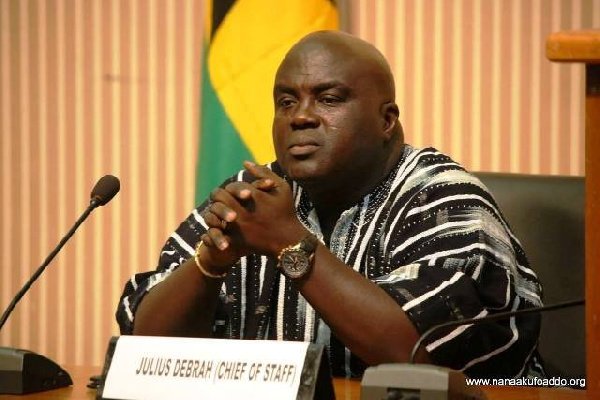Julius Debrah, a grassroots NDC loyalist from Obomeng Kwahu, holds a degree in Archaeology and Sociology from the University of Ghana.
He rose from business and tourism into national politics through resilience and strategy. Calm but sharp, he earned respect for linking local communities to national goals.
As he eyes the 2028 NDC flagbearership, his grassroots appeal is his strength, but uniting a divided party will test his political skill.
Julius Debrah’s political baptism was one of defeat, shaping his tenacity. In 2000, he contested the Suhum parliamentary seat for the NDC, securing 41.2% but losing to the NPP’s Ransford Agyapong. Undeterred, he ran again in 2004, improving to 43.5% yet falling to Frederick Opare-Ansah.
The closest blow came in 2012, when he lost by a mere 388 votes to Opare-Ansah, despite earning 48.49%—a painful reminder of Suhum’s NPP stronghold.
Debrah’s first major breakthrough came under President Atta Mills’ administration. Appointed CEO of the Ghana Tourism Authority in 2009, he led the transition from the Ghana Tourist Board to the Authority through Act 817 in 2011. modernising the sector and promoting Ghana’s cultural heritage globally.
His vision of tourism as a driver of growth and community empowerment gained national attention, leading to his appointment as Eastern Regional Minister in 2013, and shortly after, Greater Accra Regional Minister.
By May 2014, Julius Debrah became Minister for Local Government and Rural Development, where he championed decentralisation and grassroots decision-making as keys to national progress. He strengthened local governance structures, linking them to goals like infrastructure development and poverty reduction, while earning praise from traditional leaders and rural voters for his calm, results-driven style. Yet, his push for decentralisation met resistance from power brokers within the NDC, exposing tensions and hinting at future betrayals.
In 2015, Julius Debrah was appointed Chief of Staff under Mahama, steering the NDC through economic troubles and corruption scandals. The party’s 2016 election defeat marked a low point, with Debrah blamed for missteps and stepping down in 2017. Though criticised for the loss and internal disunity, he stayed loyal to Mahama and quietly worked to rebuild trust within the party.
The NDC’s 2016 defeat unleashed a wave of betrayals. As Mahama’s administration crumbled, some allies abandoned ship, eyeing their own political futures under the NPP’s dominance. Debrah stood firm, refusing to betray Mahama.
From 2017 to 2024, he worked tirelessly in the shadows, rallying NDC’s base and rebuilding its image. His efforts were pivotal in Mahama’s 2024 comeback, a historic return that stunned the NPP.
Debrah’s loyalty earned him the moniker “the one who stayed,” a badge of honour in a party rife with opportunism. Yet, this loyalty came at a cost—some within the NDC viewed his closeness to Mahama as a liability, fearing he lacked the independence to lead.
Reappointed Chief of Staff in January 2025, Debrah returned with purpose. Under Mahama’s second term, he played a key role in stabilising the government post-2024. His efforts in the Akwatia by-election, engaging traditional leaders, bolstered NDC candidates and showcased his grassroots clout.
Debrah’s clean record—no scandals, just service—sets him apart in a political landscape often marred by corruption. His experience spans tourism reform, regional administration, and executive oversight, making him a versatile leader. Yet, his return hasn’t been without friction. Some NDC factions question his influence, seeing him as too tied to Mahama.
Whispers of Debrah’s 2028 flagbearership bid are now a roar. Groups like Citizen Eye Ghana hail him as “strategic and unifying,” citing his unblemished record and grassroots appeal. His journey from Suhum’s electoral losses to Chief of Staff shows a leader forged in adversity. Yet, the path is fraught.
Rivals like Johnson Asiedu Nketia, Haruna Iddrisu, and Eric Opoku are formidable, each with their own loyalists. Debrah’s strength lies in his ability to bridge divides, but the NDC’s competitive primaries demand more than loyalty. His increased social media presence signals a calculated campaign, but early jockeying has sparked tensions. Some see him as the natural successor to Mahama; others view him as too cautious, lacking the charisma of flashier contenders.
The NDC is a cauldron of ambition, and Debrah’s 2028 bid stirs it. Public snubs and subtle digs from rivals like Asiedu Nketia hint at strained relations. The party’s chairman, a political titan, commands a loyal following, making him a formidable foe. Other contenders, like Iddrisu and Opoku, add complexity, each vying for the flagbearership.
Debrah’s calm demeanour, once an asset, now faces scrutiny—can he unify a party splintered by personal agendas? His history as a consensus-builder, from tourism to local governance, suggests he can.
Yet, the NDC’s internal politics is a minefield, where loyalty is often trumped by power plays. Debrah’s ability to navigate these tensions will define his candidacy.
In a political arena often tainted by scandal, Debrah’s clean record shines. No corruption allegations, no ethical lapses—just a career of service. From revitalising tourism to strengthening local governance, his achievements are tangible.
As Chief of Staff, he’s avoided the traps that ensnared others, maintaining a reputation for integrity. His grassroots appeal, rooted in years of engaging communities, makes him a candidate for the people, not just the elite. Yet, this very strength draws scepticism—some NDC insiders see his lack of flash as a weakness in a charisma-driven race.
The path to 2028 is a gauntlet. Debrah faces a crowded field—Asiedu Nketia, Iddrisu, and Opoku—all with strong bases. The NDC’s unity hangs in the balance, as personal ambitions threaten to fracture the party. Debrah’s losses in Suhum taught him resilience; his wins in tourism and governance, strategy.
His role in Mahama’s 2024 comeback proves he can deliver under pressure. Yet, the flagbearership race demands more—a vision to inspire, a plan to unite. Debrah’s grassroots networks and clean record give him an edge, but rivals exploit his ties to Mahama, painting him as a loyalist, not a leader.
His challenge is to redefine his image while maintaining loyalty.
Source: Ghana Chronicles

